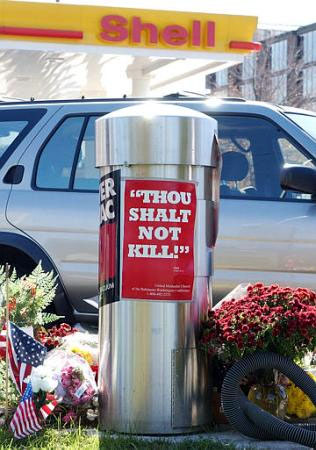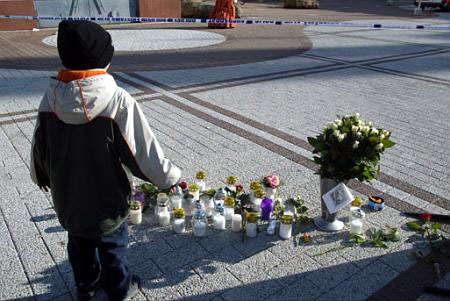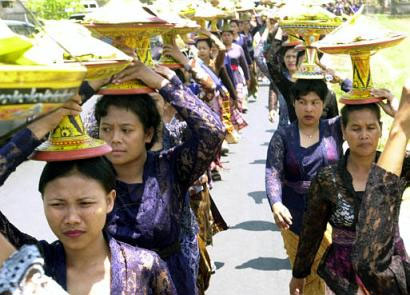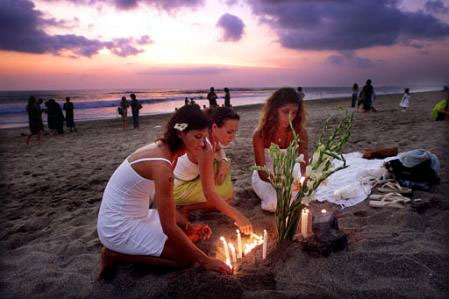


-
Left: Kensington, Maryland, USA. Lori Ann Lewis-Rivera was shot here while vacuuming her van. AP photo by Ken Lambert -
Center: Vantaa, Finland. AP / Lehtikuva photo by Marja Airio - Right: Funeral procession in Denpasar, Bali, Indonesia. AP photo by Achmad Ibrahim
An October marked by terror Bali, Indonesia is to the young Australians what Majorca or Corfu is to the Britons, or the Bahamas for the Americans: an exotic spring break not too far away from home. Until 12 October 2002, its famously artistic and open Hindu society has long been immune to the economic collapse and inter-ethnic strife that have troubled much of the world's most populous Muslim country. Now it's haunted by the deaths of 187 people, victims of a powerful car bomb detonated just outside the landmark Sari Nightclub near Kuta Beach. 30 Australians are confirmed dead, and 89 others have not been identified -- by far the largest contingent amongst the casualties from locally and all over the world. Five days later, a series of bombings began in the southern Philippines port of Zamboanga at Mindanao Island, killing seven people in shopping centers, commercial districts and at a Roman Catholic Shrine. While these barbaric crimes easily fit the modus operandi of zealots and pirates well-entrenched throughout the East Indies (the bombings of churches attributed to Jemaah Islamiyah, Abu Sayyaf's kidnappings of tourists and nurses), two coinciding atrocities elsewhere appeared to be self-motivated manifestations of evil. |
||
|
Kuta Beach, Bali, Indonesia. (AP / Ed Wray) Just as every mass- or serial shooting in America will challenge the merit of firearm proliferation, every death of an Australian national abroad is a cause for fellow citizens to review their place in the world. |
For three weeks, a series of sniper attacks killed ten people and critically wounded three others in Maryland, Washington DC and Virginia. With an elderly aunt, two cousins, their wives and six young nieces and nephews living in this area, these shootings overwhelmed me with anxiety and anger. In Finland, the bombing at a shopping center in the Helsinki suburb of Vantaa killed seven (including the bomber, a young Helsinki native), injured many others, and dealt a grievous blow to yet another nation long regarded for its progress, prosperity and blissful ennui. Worry not for the Finns. The citizenry of Suomi have come a long way since choosing the wrong side of World War II, overcoming their geographic isolation to become a prominent exporter of technology and culture. For now, the Finns can afford to feign indifference towards any single act of madness. They most certainly will not. |
|
|
It's the Indonesians who need all the help they can get. People of diverse religious and regional loyalties are discovering, belatedly, that their many years of petty but deadly conflicts have given themselves to the ways of syndicated terror. Quarrels amongst those prone to violence may as well be halted by the emergence of a common threat. If the Bali attack was indeed carried out by the usual suspects, perhaps the dreaded Indonesian army will have someone else to intimidate besides the Christian minority or the East Timorese. The Australians now stand, uncomfortably, somewhere between the insularity of the Finns and the precariousness of their Indonesian neighbours. Just as every mass- or serial shooting in America will challenge the merit of firearm proliferation, every death of an Australian national abroad is a cause for fellow citizens to review their place in the world. The Bali tragedy -- the worst loss of life during peacetime in Australian history, and the most devastating terrorist attack since September 11th, 2001 -- will surely harden the nation's resolve to combat terror originating from half a world away, while raising the question of whether to join the United States and Britain in a possible invasion of Iraq. Australians are accepting their undeniable role as a leading world power, even as they are expected by the White House and 10 Downing Street to confront both the apparent evil-doings of al-Qaeda and Baghdad's alleged propensity to restock its weapons of mass destruction. That said, whatever action the Aussies choose, it will be held accountable to themselves before anyone else. In recent memory, Canberra was both condemned for its treatment of asylum-seeking refugees (long confinement in remote outback camps, exile in Nauru), and commended for its provision of defense in the founding of East Timor. Let's hope both the DC sniper and the Finnish bomber acted on their own depravity, and not the behalf of other sinister forces. As for the mass-murderers in Bali and Mindanao, they will achieve nothing but their own eventual demise. Charles Weng, 15 October 2002, updated 24 October |
||
